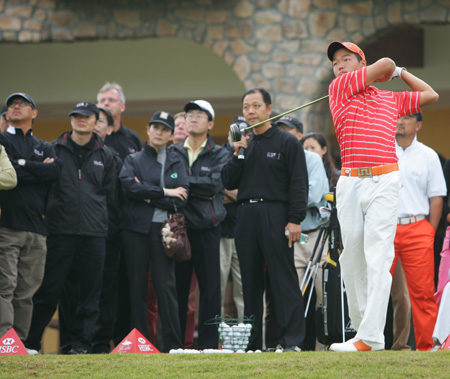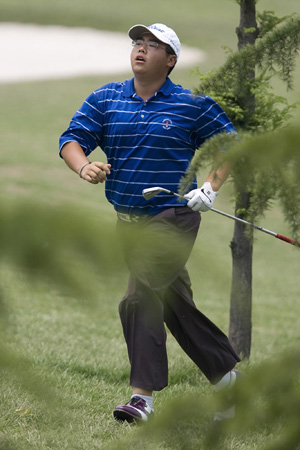By David Ferguson
This coming autumn Hu Mu, one of China's most promising young amateurs, accompanied by his compatriot Wang Minghao, will step confidently into the ranks of US College Golf in the colors of the University of Florida Gators and Georgia Tech Yellow Jackets respectively.
For Hu Mu this is deserved progress after an outstanding finish to the early summer tournaments in China, where he competed against the best of Asia and many of the European Tour's top professionals in the Volvo China Open, The BMW Asian Open, and the Beijing Open. Hu made the cut in both the Volvo and the BMW and finished a very creditable 35th in Shanghai -- indeed he went into the final round in the BMW Asian Open among the top dozen players.

All eyes on China's College Kids - Hu Mu shows off his skills (Photo courtesy of Getty images)
They join Han Ren, who last year became the first Chinese-born athlete to play men's collegiate golf in the US when he joined the University of Indiana Hoosiers, and will be followed next year by James Su Dong, who like Han has been based in British Columbia, Canada since 2003.
This new young generation of Chinese golfers intends to compete at the highest level, following a career path significantly different from that of their predecessors. Today's top players like Zhang Lianwei and Liang Wenchong built their game in a country where golf was so little-known that it scarcely even qualified as a 'luxury sport'. Wang and Su, in contrast, come from families steeped in golf – both fathers owning 18-hole Golf Clubs.
"Myself, Hu Mu, Han Ren – we're from wealthy families, we can say that. We have had good educations," explains James Su. "I went to a private kindergarten when I was four. From the private kindergarten I went to a private primary school and a private high school. Our parents can pay this sort of money. Zhang Lianwei, his parents were humble people. They were living in poverty. They couldn't get any help from their parents. Zhang went looking for a job (in golf) to help pay for food."
An additional advantage possessed by the new young guns is fluency in English. An enormous benefit of this capability is the access it provides to a much broader range of golf instruction, essential in a country where the sport is so new it has yet to produce its first truly elite-level coaches.
"The quality of their education is one of the reasons why I believe they will go to a higher level," says Zhang. "Because they have English, they can discuss golf with other players from outside China. And they're not afraid to play with players from the European and US Tours. They are international players."

James Su Dong chases down a blind shot (Photo courtesy of David Paul Morris/World Sport Group)
The current teenagers already have as many years of golf under their belt as their older countrymen. They have played almost as many high-quality tournaments, and above all they have benefitted from significantly more and much better coaching.
"If I'd started like these guys I'd probably be on the PGA Tour now. I'd probably be in the top 10. If I'd started like them, who knows?" smiles Zhang.
There may be some truth in Zhang's humor. He first picked up a club in 1985. At the time there was one modern Golf Course in China – at Zhongshan in the southern province of Guangdong in 1984. Zhang started his career at nearby Zhuhai Golf Club.
"When I started there were only two golf courses in China. Before the age of 20 I didn't know anything about golf; nothing at all!" recalls the veteran Chinese professional. "When I started I got no support – nothing. I was like a blind man. Hitting balls every day, but having no idea why they went where they went. Each year there was only one tournament to play in – the China Amateur Open. I practiced the whole year for just one tournament!"
Many of the current professionals have a similar story to tell. Almost all came into the sport through ancillary jobs at courses or driving ranges. Most had little or no knowledge at all of golf until they started work. Even the second generation of golfers did not get their introduction to the sport until their late teens – their predecessors started in their twenties. Disadvantaged by such a handicap, Zhang's achievements in going on to be the first Chinese to win a European PGA Tour event and the first to play in a Major are extraordinary. Meanwhile Liang has gone one step further by becoming the first Chinese to win the Asian Tour's Order of Merit in 2007.
In comparison, this 'third generation' started early. The product of an exponential shift in China that has seen the country move towards its socialist market economy.